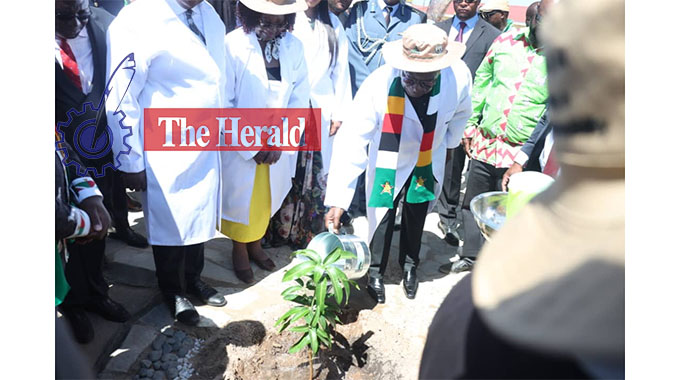Zim loses US$1bn to smuggling annually

Herald Reporter
Smuggling, ineffective border controls and customs loopholes at Beitbridge Border Post might be costing Zimbabwe nearly a US$1 billion a year in unpaid customs duty, industry leaders and authorities confirmed.
Business leaders said the organised evasion of duties not only harmed Government development efforts, but compromised the viability of businesses that abide by all customs requirements.
They want to see upgrades of border posts and modern systems, while tax officials, who decline to guess the annual losses to smuggling, want more resources to hunt down smugglers.
This comes as tax authorities recently said a special audit last year into vehicle imports had unearthed 485 sets of irregular import documents with a potential revenue inflow prejudice to Treasury of US$70 million.
Working with the Zimbabwe Anti-Corruption Commission, tax officials said in a 2019 audit report that a total of 601 cases were investigated that year with US$163,78 million being identified for recovery. This hunting down the unpaid money which is ongoing.
Last year, the Zimbabwe Revenue Authority said it was owed $5 billion in unpaid taxes, including from undeclared or under-declared high-value luxury imported vehicle duties, indicating the extent of the problem of non-compliance with customs requirements in the country.
The Zimbabwe National Chamber of Commerce, one of Zimbabwe’s largest business lobby groups, said research and market surveillance had shown that the country might be losing an estimated US$80 million monthly due to porous borders, lax customs and security systems, translating to almost US$1 billion annually.
In a position paper submitted to Finance and Economic Development Minister Mthuli Ncube ahead of his 2020 budget review this week, ZNCC said the Government should urgently deal with the deficiencies in customs procedures, border control and security systems in order to curb the leakage of hundreds of millions of dollars in potential duty revenue.
Customs duty is one of Zimbabwe’s largest sources of tax revenue, along with individual tax, accounting for billions of dollars in annual State revenue that finances key Government programmes and pays civil servants.
Zimbabwe Revenue Authority (ZIMRA)Commissioner-General Faith Mazani confirmed in an interview that the country might be losing significant potential customs duty revenue due to widespread smuggling of goods, despite ongoing concerted efforts and a broad cocktail of measures to stop import duty evasion.
Ms Mazani, however, said while it was difficult to give credible estimates of potential customs duty being lost to illegal imports and actions designed to evade or suppress duty, smuggling remained rampant despite the coterie of measures Zimra has instituted to curtail the vice.
In light of this, the ZNCC has commended Government for opening to new players, the assessment of quality of imports under the consignment conformity-based assessment programme saying the move will enhance efficiency at the country’s ports of entry.
But the lobby group said there was urgent need for allocation of funds towards improving efficiency of border systems by modernising the infrastructure at ports of entry in line with changing global trends and business needs.
“There is need to digitise all Zimra operations at the borders. Zimra should move to paperless operations. There is (also) need to increase border patrols along the Limpopo River so as to curb smuggling. Approximately US$80 million is lost annually through smuggling,” ZNCC said.
ZNCC chief executive Takunda Mugaga said in an interview that internal research, under what they call in-house surveys and market intelligence related to activities at the country’s ports of entry, revealed that rampant smuggling at border posts was costing the country dearly.
Although the problem of smuggling is common at many of the Zimbabwe’s ports of entry, the vice was more widespread and entrenched at Beitbridge, the country and region’s busiest border post that connects the continent’s north and south trade corridors with Africa’s largest economy, South Africa.
“Effective border controls, tight customs procedures and border security systems are critical because we do not want to suffocate our industry. The problem that is there is that industry is suffering from dumping of products, which Government might be oblivious of.
“There are sub-standard products being sold below the cost of production in Zimbabwe. Government is also being short-changed in terms of revenue. If all that potential customs revenue was being collected, we would not be facing the sort of current account issues we are facing,” Mr Mugaga said yesterday.
He said that for business, the most worrying issue was that sub-standard products and goods that are being smuggled, as a result not paying customs duty, were posing unfair competition.
“At one point former industry minister (Mike) Bimha put an SI to ban second hand tyre imports, but we continued to see the products in the market and one would wonder where the products were coming from.
“So, porous borders are an issue and this is why there is need to see if consignment-based certification programme is helping the country resolve the issues of imported and sub-standard goods,” he said.
The ZNCC CEO said Zimra must be capacitated to monitor the country’s ports of entry and acquire technology and infrastructure such as cameras that enable the State revenue authority to discharge its duties.
Mr Mugaga said Zimra also needed to work closely with other customs agents like immigration officials to deal effectively with the challenge of smuggling.
“I cannot put a figure in terms of smuggled goods because we can only know the potential revenue prejudice on confiscated goods, but with regard to porous borders we have no way of knowing the estimated value of what comes in or goes out,” Ms Mazani said.
She also noted that issues of border surveillance involved a number of agents, including the security forces, who must work closely with customs officials and in a very coordinated manner.
Mrs Mazani said efforts were underway to rope in the security agents such as military to effectively monitor and carry out surveillance in remote and dangerous places such as parts of the eastern Highlands, which may have landmines in some areas, but resources such as appropriate vehicles were a stumbling block.
She also said resources were standing in the way of planned programmes like border surveillance of water boundaries such as Kariba and Zambezi River.
To counter smuggling, Zimra recently said focus was now on implementing a new US$10 million tax and revenue management system (TaRMS), which is funded by the African Development Bank.







Comments